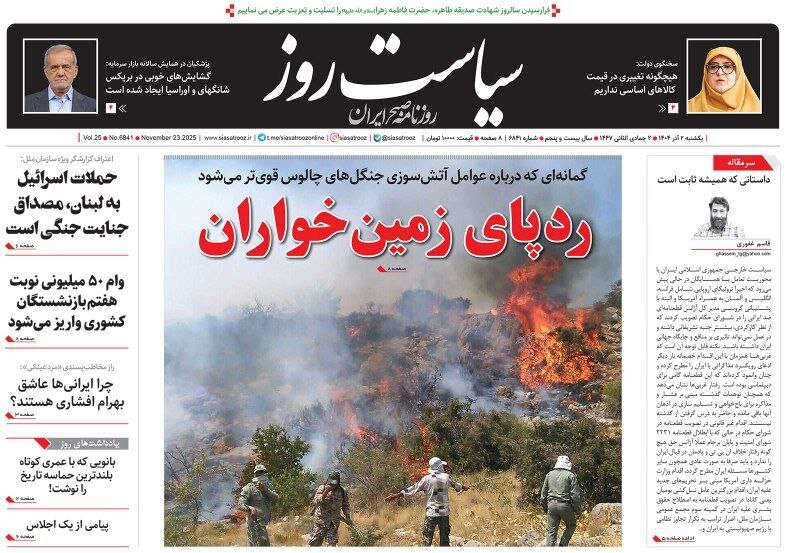Iran will not submit to Western bullying

TEHRAN - Regarding the recent anti-Iran resolution at the IAEA Board of Governors by the European trio of Britain, France, Germany (known as E3) and the U.S., Siasat-e-Rooz wrote: Iran’s foreign policy, centered on engagement with its neighbors, continues to advance even as the European troika, together with the United States and supported by IAEA Director General Grossi, passed an anti-Iranian resolution at the Board of Governors.
In practice, this resolution cannot affect Iran’s interests or global standing. What is noteworthy is that Western governments, alongside this hostile move, once again claimed to pursue negotiations with Iran, presenting the resolution as a step toward diplomacy. Their behavior reveals that the old illusion of combining pressure with negotiations to extort concessions still dominates their thinking, and they remain unwilling to learn from the past. Iran’s paradigm, however, is consistent: it will never yield to bullying or extortion, knowing that every retreat in the face of Western irrationality only invites new demands. As senior Iranian officials such as Foreign Minister Araghchi have stated, with the activation of the “snapback” mechanism and especially with the recent resolution at the Board of Governors, the Cairo agreement between Iran and the IAEA has effectively ended. The West cannot undermine this paradigm of sovereignty and resilience.
Iran: Regional convergence is best option
The Iran newspaper, in an interview with Bahador Zarei, professor of geopolitics at the University of Tehran, examined the development of Iran’s neighborhood policy. Zarei explained that at a time when Iran’s foreign policy under the sitting government is focused on deepening relations with neighboring states, the geopolitical importance of the surrounding region is more evident than ever. Iran can define a large part of its national interests within this regional sphere—provided that the “neighborhood policy” becomes a binding national strategy. In his view, the main reason Iran has lagged behind competitors in regional markets, from Iraq to Central Asia, is the absence of a comprehensive and durable framework for managing neighborly relations. “Provincial diplomacy” is a sound and complementary measure to the neighborhood policy. Strengthening this policy must remain Iran’s constant strategy, even if ways of engagement with Western powers open in the future. In this context, the Economic Cooperation Organization (ECO), as one of Iran’s key regional assets, could serve as a driving engine for regional trade, reducing economic costs and creating a shared value chain across Iran’s neighborhood.
Resalat: Europe’s real “Black Friday”
Absolute alignment of Europe with the anti-Iran resolution, stemming from the bloc’s lack of political independence, has coincided with its acceptance of humiliation in Trump’s proposed peace plan for Ukraine. This contradictory behavior comes during the period in the West known as “Black Friday.” In Western culture, Black Friday symbolizes massive sales and heavy discounts. For Europe, however, what has been put on sale at this moment is its “dignity and political independence.” This situation displays the peak of Europe’s political submission to American interests. On the Iran file, Europe has abandoned the tools of multilateral diplomacy and joined a unilateral pressure bloc. On the Ukraine file, even as Europe’s strategic interests are at risk, the bloc has accepted imposed conditions to ensure that the American military and political support will remain in place. This performance has resulted in the complete loss of credibility and dignity for Europeans in the international arena. Europe is no longer recognized as an independent, value-driven actor, but rather as an instrument subordinate to U.S. strategies. This contradictory approach undermines the trust of international partners and sends the message that Europe’s foreign policy lacks stability and fixed principles, functioning merely as a derivative of America’s momentary decisions.
Arman-e-Emrooz: Decoding Trump’s Iran policies
Arman-e-Emrooz, in a commentary on Trump’s policies toward Iran, wrote: These days, Trump repeatedly says, “We destroyed Iran’s nuclear program.” In Trump’s mind and that of his team, this statement is a political tool intended to simultaneously pursue three main objectives:
First: Preparing the American public to accept a new agreement. If the U.S. is to return to negotiations with Iran, the society must feel that such talks are not from a position of weakness.
Second: Creating psychological superiority in negotiations. When Trump publicly claims that he believed Tehran was eager for an agreement and “I am totally open to it, and we’re talking to them, and we start a process,” even if Iran has made no such request, the statement reverberates through global media and places Tehran on the defensive.
Third: By repeating this claim, Trump keeps open an exit strategy for himself in all scenarios. If negotiations succeed, he can say: “See! We destroyed them, and then magnanimously agreed.” In simple terms, this statement is no longer just a military claim; it is a golden key that simultaneously unlocks doors to political, diplomatic, and even electoral victories—regardless of how much Iran’s nuclear program has actually been damaged in reality.
